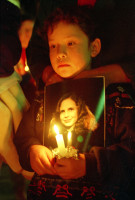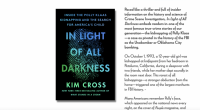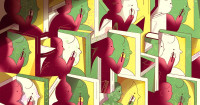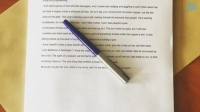
On getting the details right
thecreativeindependent.com – Tuesday November 21, 2023

Author and editor Aram Mrjoian discusses the process of selecting submitted work and developing an editor's eye.
Do you consider yourself a writer first or an editor first?
I found editing through writing. When I was an undergrad in college, I started writing fiction and some creative nonfiction. I was really bad, but continued after I graduated and then eventually got into an MFA program at Northwestern in my mid-twenties, where I started taking my writing more seriously. That’s when I thought maybe I had a shot at this.
In that program, I found editing the way a lot of graduate students do, which is through the university’s literary journal, TriQuarterly. That was my first gig in editing literary work. As a writer, I was a slow study. For years, I didn’t know how to improve my work. But when I went back to grad school, a lot of things clicked very quickly. All of a sudden I wanted to consume as much knowledge as I could to become a better writer. Editing allowed me to do that. When I started reading work that was being considered for publication, it dramatically influenced my own process and my own craft. From there, I fell in love with it. So I’ve been an editor at different literary magazines for the last seven or eight years, and have really enjoyed the community it brings about and what I’ve learned as part of that process.

Nonfiction author Kim Cross breaks down how to sell a book proposal
niemanstoryboard.org – Saturday November 18, 2023

A book project is no pursuit for impatient writers. Bringing a book from the page to stores requires a blend of timing, stamina and alchemy: a ripe idea, relevance in the zeitgeist, a confluence of favorable market conditions and editorial partners who have the determination — and means — to help sell it. Journalist Kim Cross waited nearly eight years for these factors to converge before “In Light of All Darkness” would live in the world.
Cross, who is based in Idaho, began nursing the idea of filling in reporting gaps of an infamous true crime case in 2015. She spent the next year or so tracking down archival material, interviewing subjects and mapping out the arc of a propulsive story about the kidnapping of Polly Klaas, a 12-year-old who lived in Petaluma, California, in 1993.
Cross initially pitched the book in 2015 — shortly after the publication of her first book, “What Stands in a Storm” — but didn’t land a deal. After a potential offer fell through, she shifted her attention to other projects. Then, in 2021, Cross found an editor and publisher who felt like a good fit and were committed to publishing the book “with muscle,” as she puts it.
Storyboard talked with Cross about what nonfiction writers need to know about the book publishing process, how a book proposal mirrors and diverges from a magazine pitch, and the roles that each editorial partner plays. Our conversation has been edited for length and clarity.

Peek inside a successful book proposal
niemanstoryboard.org – Friday November 17, 2023

Author Kim Cross annotates the lengthy proposal that landed a contract for the book that revisits the 1993 Polly Klaas kidnapping
This is one of two posts featuring Kim Cross on the successful pitch-and-proposal process that led to her new book, ‘In Light of All Darkness.’ In this post, Cross annotates the proposal that landed her a contract after previous pitches fell short. In a companion piece, Cross answers questions about agents, timing and money.

5 Pieces of Terrible Writing Advice You Should Totally Ignore
nofilmschool.com – Thursday November 16, 2023

We've all heard some terrible writing advice in our lives. It might have been from so-called "experts," professors, or even in an unhelpful YouTube tutorial, but there are good writing lessons at the heart of every bad note. Let's look at a few together to see what you can glean.
Tell me if this rings a bell, you're attending a screenwriting seminar, listening to a lecture, or getting notes from someone, and they lean in and tell you they have a piece of advice. After hearing it, you shake your head. You feel a little worse off than you started, and you're not sure what to do next.
Terrible writing advice is all around us. Bad writing advice comes from many sources. We hear it in blogs, podcasts, and all over Social Media.
Today I want to go over the 5 biggest pieces of terrible screenwriting advice I've heard, debunk each of them, and give you the proper lessons to take away from each of them.
Ready? Let's go...

My First Thriller: Joseph Finder
crimereads.com – Thursday November 16, 2023

Joe Finder must have thought he knew the secrets to selling a book. His first, a work of nonfiction, Red Carpet: The Connection Between the Kremlin and America’s Most Powerful Businessmen, had a hardcover run of 10,000.
It sold out.
Sounds like an early and smooth ride into the literary sunset. But there’s a catch. (There’s always something in book publishing.)
Finder, a Harvard graduate student in Russian Studies at the time, managed to anger one of the richest and most powerful men in America while writing Red Carpet. The man was so mad he approached Finder’s academic advisor with a proposal: kick Finder out of school and he’d write Harvard a check so big they’d have to use a wheelbarrow to deliver it. He also tempted the university with a trove of personal papers for its archives.

Big Publishing Killed the Author
newrepublic.com – Wednesday November 15, 2023

The suggestion that Beloved, Toni Morrison’s acclaimed novel about slavery and its afterlives, is also a parable about the publishing industry would be bizarre, even offensive—if, that is, Morrison herself hadn’t explicitly suggested it. For years, Morrison had felt not merely penned in by her career as an editor at the publishing giant Random House; she had felt indentured, “held in contempt—to be played with when our masters are pleased, to be dismissed when they are not,” as she declared in a speech six years before publishing Beloved. Upon leaving her job at Random House to focus on writing full-time, she felt “free in a way I had never been, ever.… Enter Beloved.” It was, she continued in the novel’s preface, “the shock of liberation”—liberation from the world of corporate publishing—“that drew my thoughts to what ‘free’ could mean.” In the novel itself, Morrison has Baby Suggs, the protagonist’s mother, describe freedom from slavery in strikingly similar terms.

How To Write A Query Letter That Makes Literary Agents Take Notice
livinggossip.com – Tuesday November 14, 2023

Writing a query letter is a crucial step in the journey of getting your manuscript published. Literary agents receive countless submissions daily, and your query letter is your first chance to make a lasting impression. To ensure that your work gets the attention it deserves, you need to craft a compelling query letter that stands out from the rest. In this guide, we will provide you with a step-by-step process on how to write a query letter that literary agents will find irresistible. Let’s get started!

How to Become a Short Storyist
By G. Miki Hayden
Instructor at Writer's Digest University online and private writing coach
firstwriter.com – Tuesday November 14, 2023

I wanted to become a novelist, but a friend of mine gave me a tip: “Write short stories as credentials you can mention in query letters for your novels.” I decided to follow her advice, plus I could write a short story in a couple of weeks for some quick satisfaction.
Since then, I’ve written and published generous handfuls of short stories, won a couple of short story awards, and made a little money at the game—mostly very little—but all coinage counts.
I want to herein present some revelations as to “how I do it.” But in addition to my having short stories published many times, I also have many worthy pieces not yet published, so don’t follow me there.
I don’t concentrate on just one element in the story when I write and then layer in other aspects—though you can do that. I also rarely restructure. I write and then polish. However, while I certainly think that writing everything at the same time produces a more cohesive piece, I also will suggest that my students (at Writers Digest’s Writers Online Workshops) can deposit in elements later on if they aren’t able to provide them in the initial draft.
The most common essentials that students will miss in their short story writing are emotion, setting, and point-of-view character internals.
The eliciting of emotion is definitely an important fundamental of fiction, but that’s probably the hardest thing for writers to do. So I don’t really mean that exactly, as creating suspense, tension, the onset of romance, or even reader sorrow is extremely difficult. If writers can actually trigger reader feelings—wonderful—they may make a lot of money selling their manuscripts. But if they can’t, then they can at least include the mechanical representation of these sensations. We are always able to write “His heart thudded in his chest, and he thought he would faint.” That will substitute for the real thing in many instances, and a writer does need to have at least elements of emotion to round out any story.

Faber chair Page says he is 'confident' publishers will adapt to AI
thebookseller.com – Tuesday November 14, 2023

Stephen Page, Faber and Faber chair, has said that he is "confident" publishers will find their way with AI, adding that "technology usually amplifies publishing".
In a public lecture delivered at the University of West London on Thursday 9th November, Page reflected on the "five revolutions" that publishing has undergone over recent decades and how the book trade can rise to future challenges instead of being "swept up" in them. He said that human, intellectual, social and financial capital are "at the heart of what has made publishing endure" and will be essential in future challenges like AI.
"Publishing is innately revolutionary in its makeup," Page said. "It takes the ideas that will change society [and] makes them public through putting them into the world."

What's the Future of Books?
esquire.com – Thursday November 9, 2023

The publishing industry is in flux. One major publisher has been acquired by a private equity firm, editors are departing (and getting laid off) from others, there are fewer book media outlets than ever, and most literary discourse is happening online. But what does it all mean for the books themselves, and the ways that readers are discovering them? Here, we make some predictions about the future of books.
“Celebrities and tastemakers are becoming the new medium for discovery,” says Ariele Fredman, a literary agent at United Talent Agency who previously launched eight #1 New York Times bestsellers as a publicist. As a result, it will be more important than ever for debut novels to land on book club rosters.
A Reese Witherspoon, Oprah, or Jenna Bush endorsement can be enough to not only secure a spot on the bestseller list, but anoint an author with a fanbase that lasts. “If you don't get one of those coveted spots, it becomes even harder to break a new voice,” Fredman adds.
Outside of those chosen debuts, “we're going to see a continued investment in bigger-name authors” from publishers, says former editor Molly McGhee, the author of Jonathan Abernathy You Are Kind, “because they have guaranteed returns on investment.”
Get the free newsletter | Submit a news item or article | Get Writers' News for your website





